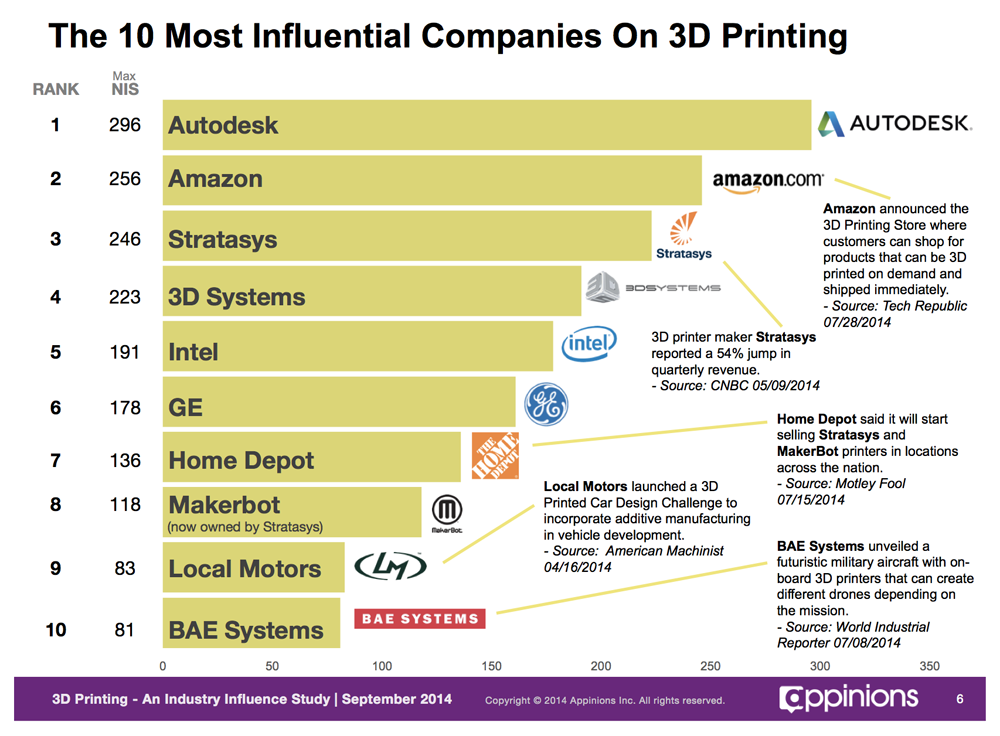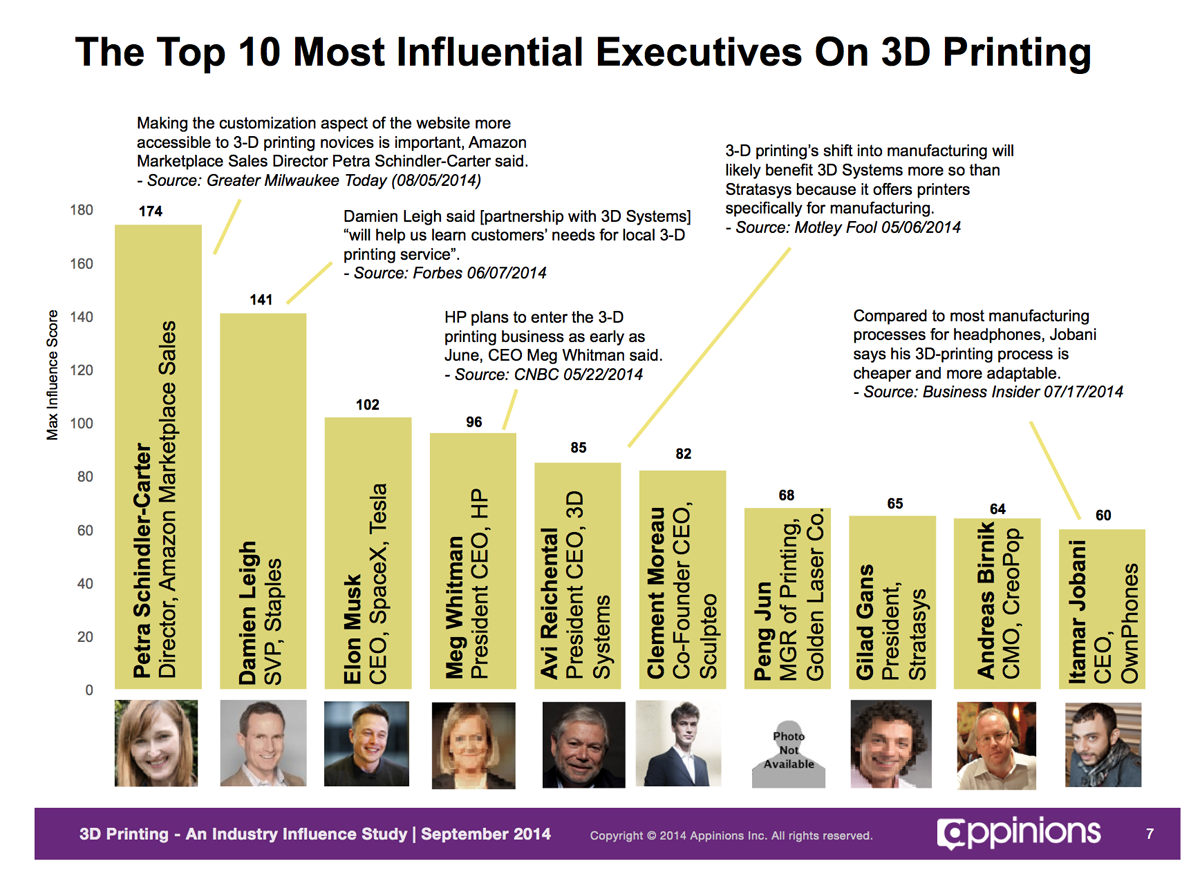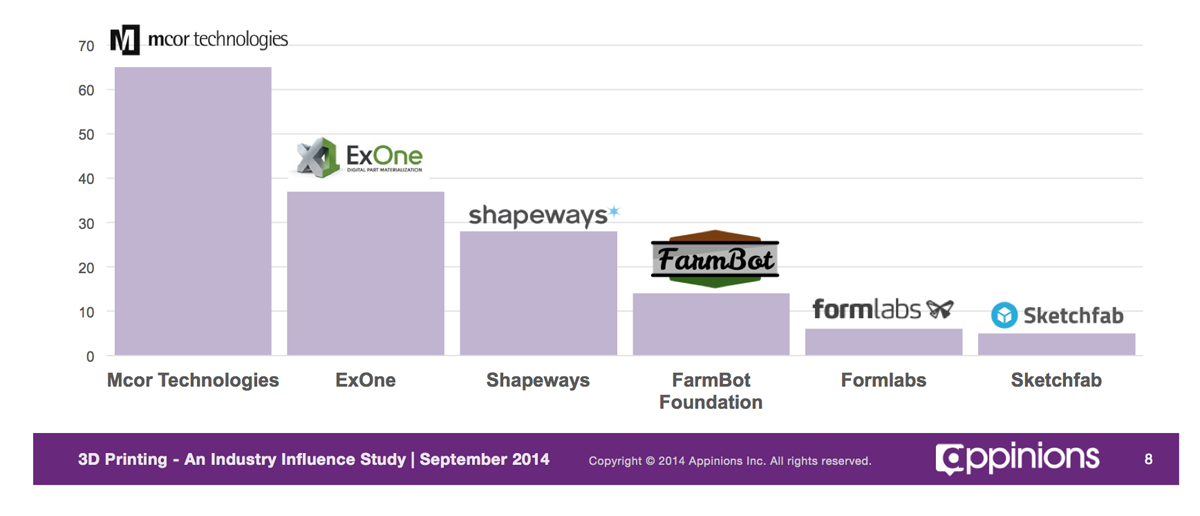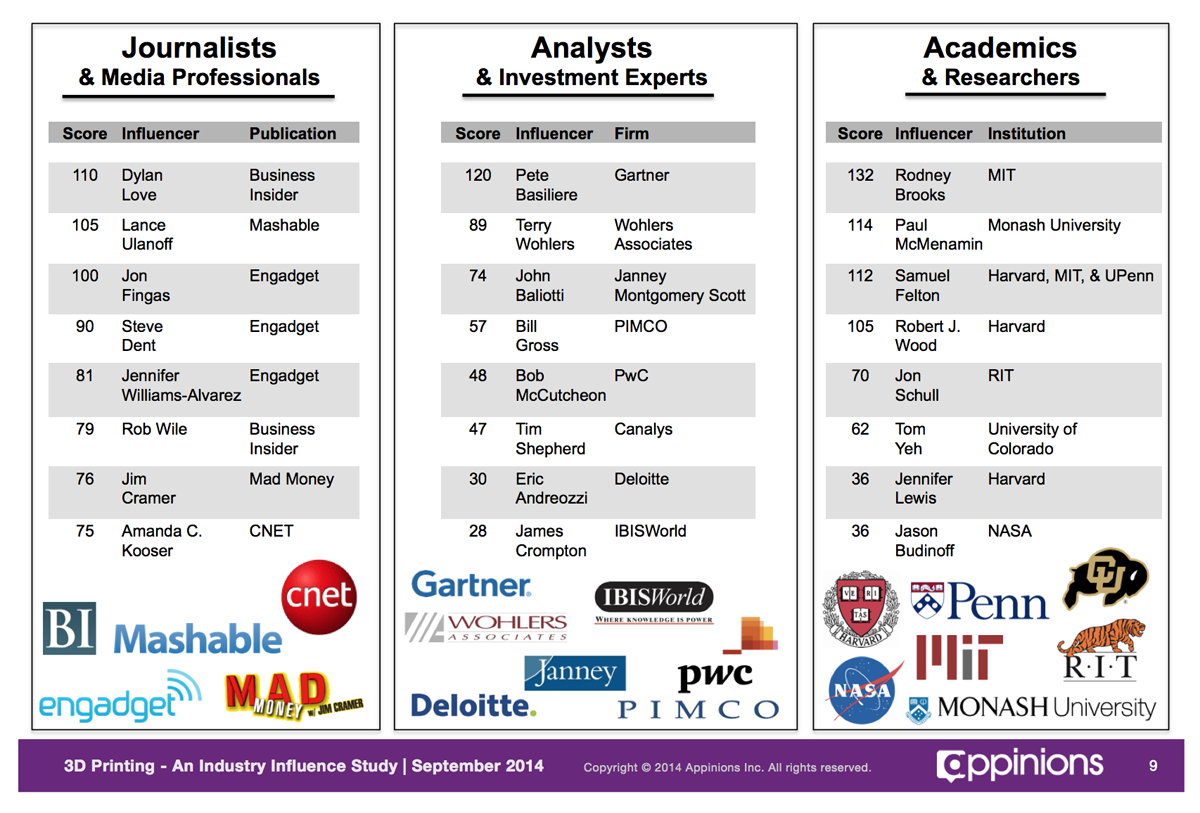A number of publications have been relaying a report from a marketing research firm called Appinions, including Forbes, with which Appinions has previously partnered. The report, titled “3D Printing Influence Study” purports to represent the leaders in the 3D printing industry, including the most influential companies, executives, and more. And, though outlets like Forbes and some 3D printing blogs have since covered Appinions’ findings, when we first saw it last week, we talked about it but collectively dismissed it with a bit of a chuckle at some of the ludicrous claims it made. We’re writing about it now, though, because some people are taking it as gospel! We think that would be a mistake ….
As an example, the report observes: “3D printer manufacturers are relatively rare, and there is great attention paid to announcements of new products or market entrants.” Those that have been following the industry for a brief period of time may be taken aback by this statement, familiar with the startling number of desktop 3D printer manufacturers in the field. From my own research, I have counted more than 215 makers of desktop machines, others place the number much higher. It’s possible that Appinions was referring to manufacturers of industrial 3D printers, which may number closer to 20, or so, but other details in their report make me skeptical still.
Looking at their charts outlining the industry’s most influential companies and executives, I had a hard time understanding the criteria they used to determine a person’s or business’s influence. Appinions creates what it calls a “Net Influence Score (NIS)”, which it creates using patented technology that calculates the NIS “for any person or company who has expressed a topically relevant opinion and elicited a reaction from others.” They write, “We completed full-text analysis on nearly 100 million documents between 5/1/14 and 8/27/14 for this research.” This analysis resulted in the charts you see in this article.
You’ll see that, according to their NISs, Autodesk and Amazon are the most influential companies in the business, ahead of Stratasys, 3D Systems, GE, Intel, and Home Depot. To me, there’s no doubt that Amazon does have influence in the industry now, but I am skeptical as to their reach over Stratasys and 3D Systems, the two largest manufacturers of 3D printers in the world. And, the fact that Home Depot is even on the list, simply for providing a retail outlet for MakerBot machines in their stores, confuses me even more.
Their list of “The Top 10 Most Influential Executives On 3D Printing” includes, from most to least influential: Petra Schindler-Carter, Director of Amazon Marketplace Sales; Damien Leigh, SVP of Staples; Elon Musk, CEO of SpaceX and Tesla; Meg Whitman, President and CEO of HP; Avi Reichental, President and CEO of 3D Systems; Clement Moreau, Co-Founder and CEO of Sculpteo; Peng Jun, Manager of Printing at Golden Laser Co.; Gilad Gans, President of Stratasys; Andreas Birnik, CMO of CreoPop; and Itamar Jobani, CEO of OwnPhones. What’s odder than the seemingly random assortment of executives, with 3D Systems and Stratasys represented below Staples and SpaceX, is that the President of Stratasys North America, Gilad Gans, is ranked as more influential than the company’s CEO, David Reis. I may have a pretty broad misunderstanding of executive hierarchy, though.
I doubt myself a whole lot – particularly due to my own childhood and the overall state of insecurity generated from the consumer culture at large, not to mention the ontological diffidence caused by not knowing what reality is – so, I thought that I may have missed something in their report. When I came across Appinions’ graph depicting the “startup scene’s” major influencers, however, I felt pretty sure about my intuition. The report lists Mcor, which has been in the industry for seven years, as the most influential start-up in 3D printing, just two positions ahead of FarmBot, a one-man hypothetical farming robot that is only inspired by 3D printers (and CNC machines).
It was at that point that I realized that whatever algorithm Appinions was using to determine how influential anything was, was probably pretty flawed, if not totally arbitrary. Other tips offs included the fact that Nottingham University isn’t anywhere to be found on the academics and researchers list, Terry Wohlers is behind Gartner on the Analyst list, and that the guy from “Mad Money” was one of the most influential journalists in this space. And what finished me off? That the report deems that MakerBot’s position in the market is being “attacked” by Stratasys(!!) and 3D Systems.
“Makerbot is fumbling, despite their brand recognition, and is now only the number 8 company in the field.
This is due to attacks from both above and below. Heavyweights like Stratasys and 3D Systems are attacking them from on top, while new startups like MCor and ExOne are shaking things up underneath them.”
Where do you even start with that?
Comparing MakerBot and Mcor is like comparing chalk with cheese — but holding a MakerBot up next to an ExOne platform for comparison is as useful as saying this beach buggy is comparable with that Rolls Royce — well, they do both move forward when driven. As for parent company, Stratasys, attacking the market of its most lucrative subsidiary, it suggests that the “numbers” are being crunched with little, if any, qualification or understanding.
The report further elaborates on how the Net Influence Score is calculated:
The score considers: 1) Which people or entities reacted to an opinion, weighted by their respective influence on that topic; 2) What is the credibility of the outlet where the reaction was published or consumed; and 3) What volume of reactions were generated based on the opinions attributed to that influencer over the past 60 days.
So, I suppose the NIS could just be the result of gathering the opinions of misinformed people retweeting things about famous, and sometimes obscure, brands and companies. Either way, the study probably shouldn’t be taken too seriously, IMHO, but neither am I apportioning blame either, because, as I alluded to in an article on a company called 6th Dimension, we’re all just trying to survive around here and, in a system that makes that difficult to do without a lot of money, people will do questionable things to do so. I’m guilty of it! We all are! Let’s all just work together to try to be as decent as possible and aim for happiness, instead of financial wealth.






